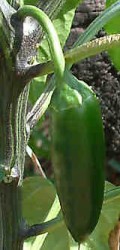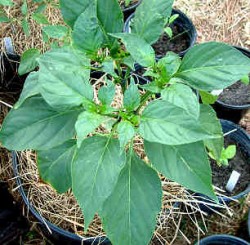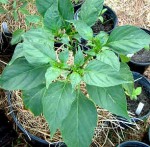Jalapenos in the Garden
Jalapenos have to be the most-recognized chile pepper around. You probably see them at the grocery store, and you’ve likely downed your share of them. But what about growing them in the garden?
The Humble Jalapeno
 You may not know this, but there are a multitude of jalapeno varieties. They all have the same basic pepper shape, but would you believe they come in different colors? Not to mention different sizes and Scoville units (“heat” to the uninitiated).
You may not know this, but there are a multitude of jalapeno varieties. They all have the same basic pepper shape, but would you believe they come in different colors? Not to mention different sizes and Scoville units (“heat” to the uninitiated).
Now most of the time the jalapenos you see and/or grow are the green peppers we all know and love. But they come in yellow and purple, too! And all varieties ripen to red (which can be fire-engine or quite deep burgundy).
How Hot — Or Not?
Yes it’s true, these versatile chile peppers come in several degrees of heat. There is the “regular” jalapeno, which is around 4,700 Scoville Units.
There’s also a “lite” variety called Tam Jalapeno that has less heat — somewhere in the vicinity of 2,000 SUs.
And for those who love these peppers but for whatever reason can’t take the heat — there is at least one variety that’s barely at 500 SUs.
To the best of my knowledge, there isn’t a super-hot jalapeno, but if you live in a warm climate, your peppers will get hotter as your weather warms up. In addition, if you let the peppers ripen to red, they are hotter yet!
Jalapenos — Does Size Matter?
You can look at this two ways — size of the pepper itself, or size of the plant.
There’s a variety called Mucho Nacho whose peppers are roughly twice the size of the standard jalapeno — great for anyone who can’t get enough of a good thing!
As far as the plants go — well, be prepared for the possibility of a large plant. Like 4 feet tall and just about as wide (yes, I’ve had them like that). That’s when they are planted in rich, well-drained soil and have plenty of warmth and at least 8 hours a day of direct sunlight.
If your soil, warmth or sunshine isn’t up to snuff, the plants will very likely be smaller; how much smaller depends on the conditions.  But 2 feet tall is a good guesstimate.
 You can also grow these chile peppers in containers (which is what I am personally doing now). A 5-gallon pot will give you plenty of peppers to pick.
You can also grow these chile peppers in containers (which is what I am personally doing now). A 5-gallon pot will give you plenty of peppers to pick.
Just make sure to keep it well-watered and fertilize it more often than you would if it were in the ground. (I like to fertilize weekly, with 1/3 to 1/2 strength liquid fertilizer — fish emulsion is my favorite.)
The plant in the picture is roughly 18 inches tall at the moment, and it’s come through some chilly weather the last month or so. But now that the weather is warming up, I expect it to grow at least another 12 inches by the time everything is said and done. For more information, check out my post on growing chile peppers in containers.
No peppers are ready for picking, but I’ve got plenty of blooms to tantalize me, knowing that most (if not all) will become a hot jalapeno.
While I don’t know for certain, I’m pretty sure this is the variety called Jalapeno M. It’s a nice open-pollinated variety that does well in most climates. If you need some tips, check out the growing chile peppers post.
Jalapeno peppers in the garden are easy to grow and quite forgiving. Give your plant(s) some care and you may end up with more peppers than you know what to do with!
